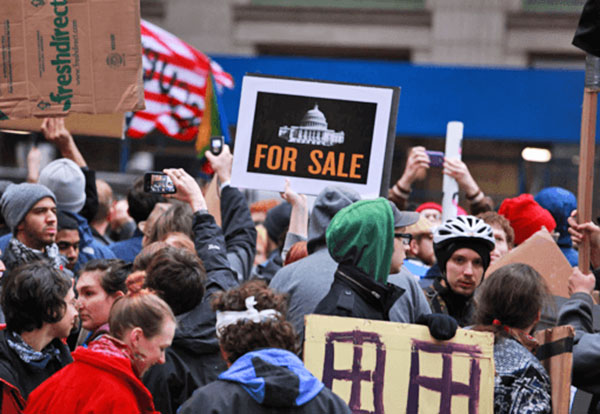|
from
CounterPunch Website CC BY 2.0
Time and Trump are now displacing Cold War legacies. Where capitalism was questioned and challenged in the 1930s and into the 1940s, doing that became taboo after 1948.
Yet in the wake of the
2008 crash, critical thought about capitalism resumed. In particular
one argument is gaining traction: capitalism is not the means to
realize economic equality and democracy, it is rather the great
obstacle to their realization.
They shifted toward
greater equality.
Indeed, the New Deal
reversal was such an interruption and featured just the sorts of
taxation of corporations and the rich that Piketty favors now to
correct/reverse capitalist inequalities.
What Piketty proposes now again as a remedy proved then to be merely temporary. The reversal was itself reversed.
After 1945, corporations and the rich devoted their profits and their high incomes/wealth to buy even further control of the two major political parties.
That extra control
enabled them to undo the New Deal and to keep it undone.
That lesson implies
skepticism about whether tax-based - or indeed, any - reversals can
be more than temporary given capitalism's proven success in undoing
them. Such skepticism hardens when parallel evidence emerges from
other capitalist countries' likewise merely temporary reversals of
basic tendencies to deepening inequalities.
It is to face the fact that mere reforms such as tax law changes are inadequate to the task. To make reforms stick - to overcome temporariness across so many histories - requires going further to basic system change.
Because capitalism tends
toward deepening inequality and can defeat reversals by keeping them
temporary, it is capitalism that must be overcome to solve its
inherent inequality problem.
The "democracy" label that so many modern nations use to describe themselves has always been a misnomer. The political sphere was indeed, at least formally, a place where governmental decisions were made by persons accountable eventually to a one-person-one-vote election.
In that precise sense,
those required to live with a decision exercised the democratic
right to participate in making that decision via the accountability
of governmental officials.
These included deciding what, how and where to produce and what to do with the net revenues (or surplus or profits) of the enterprise.
The leaders were not at all accountable to the people - all the other employees - who had to live with the results of those basic enterprise decisions. The latter were excluded from participating in key economic decisions affecting and shaping their lives.
In short, "democracy" has
been applied to societies whose political/residential sphere was at
least formally democratic but whose economic sphere was decidedly
not.
Democracy was redefined in practical terms as the liberty of the individual/private from the intrusion of the state/public.
The democratic quality of the individual/private enterprise - the central structure of the economy - was exempted from analysis or even from view in terms of its structural incompatibility with democracy. Legalistic equations of capitalist corporations with individual personhood also helped to distract attention away from the undemocratic structure of the corporation.
Likewise, the U.S.
government's commitment to a "democratic foreign policy" fostered
the reproduction elsewhere of the same undemocratic economic
structure that characterized the U.S.
It built its ideology on the notion that democracy meant a state kept from intruding on the lives and activities of persons and enterprises rendered as equivalently "individuals."
Equality to them meant equality of opportunity, not outcomes:
The left wing of U.S. politics has always tried hard to sustain the notion that capitalism was not only compatible with egalitarianism and democracy.
It would also be strengthened, not threatened, by moving capitalist society closer to equality and democracy. In practical terms it contested against the right wing by insisting that the mass of people - the workers in capitalist enterprises - would become disaffected from and disloyal to capitalism if it indulged its anti-egalitarian and anti-democratic tendencies.
Capitalism, it argued and
argues, will be strengthened not threatened by less inequality and
more democracy.
"Populist" is the currently popular epithet that expresses this fear.
Both parties contest for
the support of the leaders of capitalism - major shareholders and
the corporate boards of directors they select - by offering their
alternative strategies for avoiding, controlling, or safely
channeling mass disaffection with capitalism.
The Democratic Party offers a mix of limited, gradualist support for movements toward less inequality and more political democracy.
It offers itself as the means to bring marginalized groups into full participation in capitalism, thereby keeping them from populism.
Each party leadership deplores populists and tries to associate them with the other party. Democrats especially see populism in Trump; Republicans and quite a few centrist Democrats see it especially in Bernie Sanders.
Both parties rarely refer
to "capitalism" per se. Both proceed as if no critique of or
alternative to capitalism exists or makes any sense.
Because those goals are never achieved they have long served as objectives to which both Parties offer lip service.
The absurd contradiction of their shared position is now giving way to the recognition that the necessity for system change is the lesson of U.S. history
If, in place of
capitalist enterprise structures, a transition occurred to worker
cooperatives with democratic organizations and procedures - likely
to distribute net revenues far less unequally among enterprise
participants than capitalist structures did - it would have removed
a key obstacle to a broader social movement toward equality
and democracy...
|


